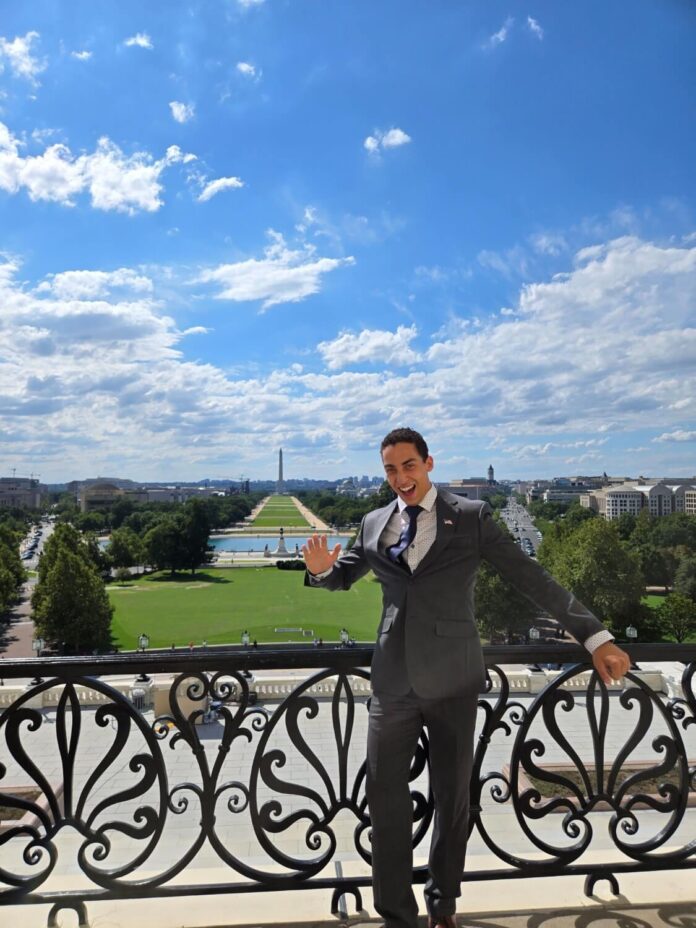The Occidental Washington D.C. Internship is a program where juniors and seniors from Occidental spend a semester in the nation’s capital, providing students with the opportunity to see how the U.S. government operates, according to one of the program’s advisors, politics professor Regina Freer.
“You can read about it. But to actually experience it and even influence it has been really valuable for our students,” Freer said.
The Oct. 1 government shutdown has affected the internship program.
Sienna Schmulbach (junior) is one of the students participating in the program this semester.
“I declared my politics major in the fall. At that time the political landscape was changing so much, and it didn’t feel real in Los Angeles,” Schmulbach said. “I thought it would be an incredible experience and opportunity to learn about what’s happening by seeing it.”
Diego Saenz (junior), another student in Washington this semester, said he was drawn to the program by a lifelong interest in government.
“I’ve always been curious about how everything functions, specifically how people’s voices enter a government space and how that is turned into action,” Saenz said.
Schmulbach said that for her, the internship has been a first step into the world of law.
“I want to go to law school, and I want to help with things like restorative or transformative justice, so the Washington Internship Institute suggested I apply to work for Offender Aid and Restoration [OAR],” Schmulbach said.
Saenz says he has been working in the U.S. House of Representatives, mostly dealing with constituent relations.
“It’s a whole array of things. We get emails, phone calls, we even have multiple inboxes that take in different concerns,” Saenz said.
However, Saenz’s work was cut short by the ongoing government shutdown.
“Because of the shutdown, I had to take things into my own hands and reach out to different people, and I am now working at Intersect Public Affairs,” Saenz said. “For a lot of the federal workers who don’t have as much flexibility as interns do, it’s been hard.”
According to Freer, the internship program did not prepared for a shutdown, but the impact was mitigated by the students finding new places to work.
“Ultimately, Diego found and secured his own placement, which was amazing and a testament to his own ingenuity,” Freer said.
According to the students in Washington, the city has changed in their time there, due both to the government shutdown and the ongoing deployment of National Guard troops to the city. Schmulbach said her work with OAR has been much more affected by the deployment than the shutdown, with arrest rates increasing rapidly.
“I think that the Black community in the DMV is going to be very disproportionately affected, and that is mainly who we serve,” Schmulbach said. “The good news is that there’s a lot of resistance, and a lot of people continue to talk about this.”
Saenz, meanwhile, said he has noticed a change in the city’s temperament since the shutdown began.
“Prior to the shutdown, there was not much of a worry,” Saenz said. “Now there’s a bit of tension to get something in place after three weeks, but a lot of people are looking to resolve that tension by volunteering at the food bank, canvassing or going out.”
According to Freer, students often return from the program with a new perspective on government.
“They have a sense of watching theory in action,” Freer said. “I’ve had a number of students who have been able to see nuances in how government operates and how the multiplicity of actors have influence, and that’s really beneficial.”
Saenz said he has learned about the wide range of people and groups influencing politics.
“I think the biggest thing that I found out is that no matter what field you go into, it has a form of advocacy,” Saenz said. “I thought that government was the only way of bringing about change, but I learned that it’s the constituents, the businesses, the artists, even the finance behind them, that voice their opinion to the government. No matter where you come from, you still can have a role in bringing about what you want.”
Schmulbach said that over the course of her time in Washington, she’s come to believe that the justice system is broken.
“Almost every single person I see in court is Black, and they are very often unhoused and in for poverty-related crimes,” Schmulbach said.
Schmulbach said her time spent working with incarcerated people has made her a kinder and more thoughtful person.
Saenz said that he will not just return to Occidental with a greater sense of civil duty, but with relief as well.
“It’s a relief in knowing that, while it’s good to have a plan, it’s also okay to speak up and to chase the feelings that you do have,” Saenz said. “The civil duty doesn’t just have to be within a political sphere, it can be something you have no matter where you go.”
Contact Whittaker Perrin at wperrin@oxy.edu
![]()































